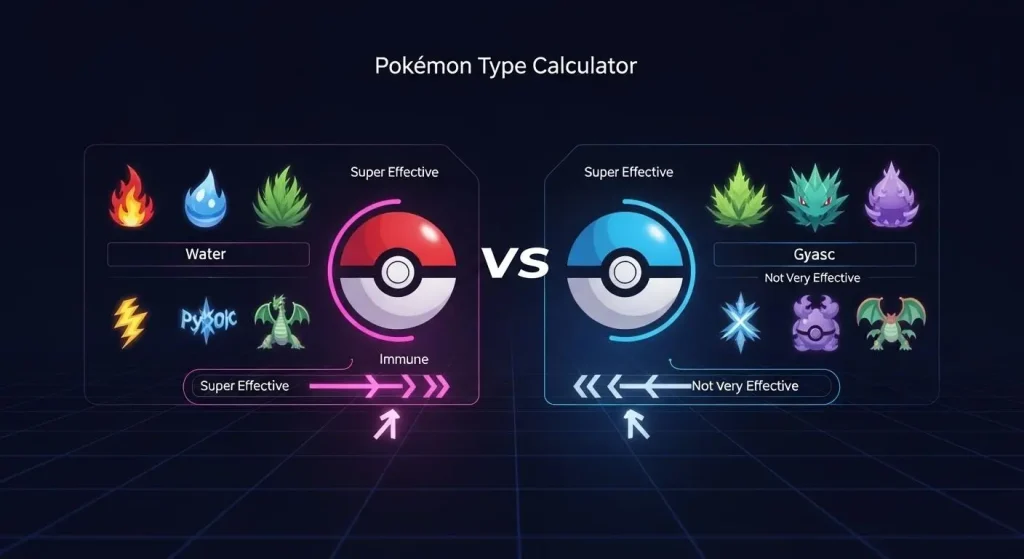Welcome to the ultimate Pokemon Type Calculator — your go-to tool for checking weaknesses, resistances, immunities, and type coverage. Whether you’re playing the mainline Pokémon games, building a competitive team, or battling in Pokémon GO, this calculator makes type matchups simple.
🔍 Pokémon Type Weakness Checker
What is a Pokemon Type Calculator?
A Pokémon type calculator is an interactive tool that shows how different Pokémon types interact. By selecting one or two types (for example, Fire or Fire/Flying), you instantly see:
- Weaknesses (2× or 4× damage)
- Resistances (½× or ¼× damage)
- Immunities (no damage at all)
This makes it much easier than memorizing the full type chart calculator.

How the Type Calculator Works
The type matchup calculator uses the official damage multipliers from the games:
- Super effective = ×2 damage
- Double weakness = ×4 damage (e.g., Rock vs. Fire/Flying)
- Resistance = ×0.5 damage
- Double resistance = ×0.25 damage (e.g., Bug vs. Grass/Steel)
- Immunity = ×0 damage (e.g., Normal vs. Ghost)
This applies across all generations, including Gen 9 (Scarlet & Violet) and Pokémon GO type effectiveness (slightly different multipliers).
Pokemon Type Coverage Calculator
The type coverage calculator Pokémon players love is perfect for team building. It shows whether your moveset or team has enough coverage against common types.
- Enter your moves or team → check which types you can hit super effectively.
- Spot gaps in your team type calculator setup.
- Balance your roster for PvP or raids.
This feature works like a team-type coverage calculator — a must for competitive battles.
Pokemon Team Type Calculator
Building a team? Use the Pokémon team type calculator to:
- Check shared weaknesses across your party.
- Find defensive holes (e.g., too many Water weaknesses).
- Optimize synergy with resistances and immunities.
For advanced planning, try the Pokemon team type coverage calculator to see how well your team’s moves handle every type.
Dual Type & Tera Type Calculators
- Pokémon dual type calculator → See combined weaknesses and resistances (e.g., Dragon/Fairy).
- Pokémon dual type weakness calculator → Find stacking weaknesses (e.g., Rock vs. Fire/Flying).
- Pokémon Tera type calculator → Plan the best Tera type for Scarlet & Violet battles.
Some fans even explore concepts like a Pokémon 3 type calculator or triple type Pokémon calculator, though these are fan-made scenarios.
Pokemon Type Chart Calculator
For quick reference, you can also check our Pokemon type chart calculator. This is a full type matchup chart showing every advantage, resistance, and immunity in one grid.
You can get the complete and in depth type chart here.
How to Use Pokemon Type Calculator
Using one isn’t complicated, but here’s the general flow:
1. Select Your Pokemon’s Typing
Choose either single type (like pure Electric for Jolteon) or dual type (like Fire/Flying for Charizard).
2. Hit Calculate
The tool runs the matchup instantly.
3. Review Weaknesses
Look at the multipliers.
- 4× Weak = huge danger. Avoid those.
- 2× Weak = risky.
- Neutral = fine.
- Resistances = where you shine.
4. Plan Counters
If you’re fighting a Grass/Steel (like Ferrothorn), the calculator will show it’s quadruple weak to Fire. That’s your golden ticket.
5. Adjust Teams
Swap in attackers that exploit weaknesses, or defenders that cover your team’s holes.
You can also read complete guide on How to Use Pokemon Type Calculator on my site.
What’s the difference between a Pokemon type calculator and a type chart?
The calculator is interactive and works for dual types, while the chart is a static grid.
Can I use this for Pokemon GO?
Yes! The Pokémon GO type calculator uses adjusted multipliers (e.g., 1.6× instead of 2×).
What’s the best dual-type in Pokemon?
Steel/Fairy and Dragon/Fairy are among the strongest defensively.
Is there a Pokemon damage type calculator?
Yes — that’s part of this tool. It shows weaknesses, resistances, and immunities.
